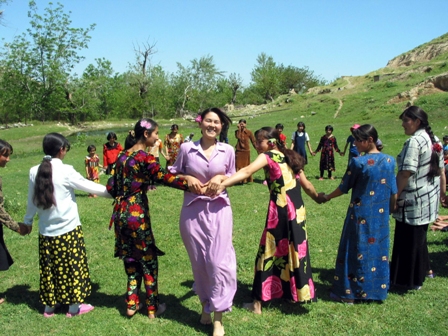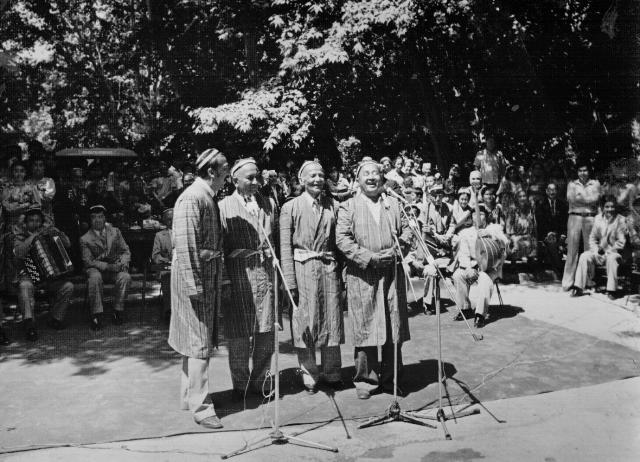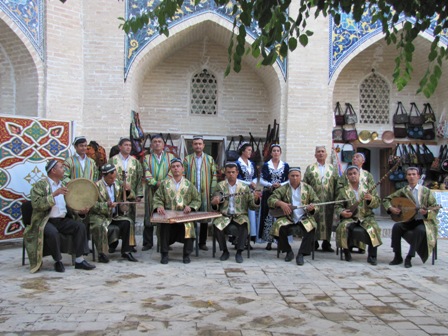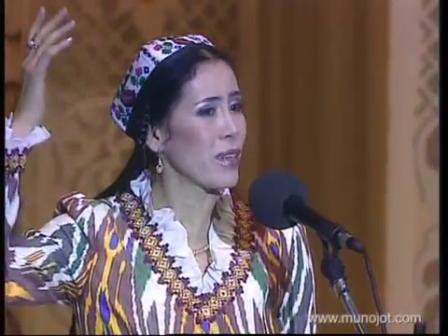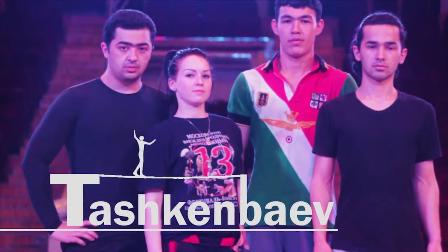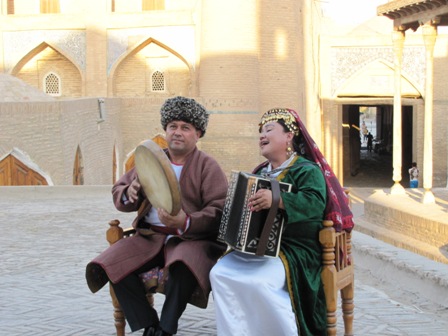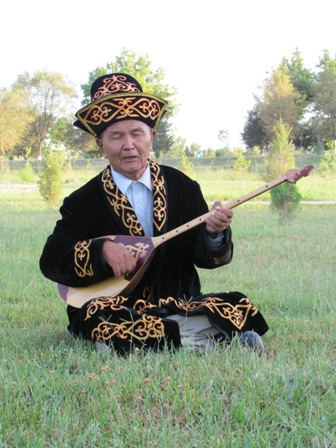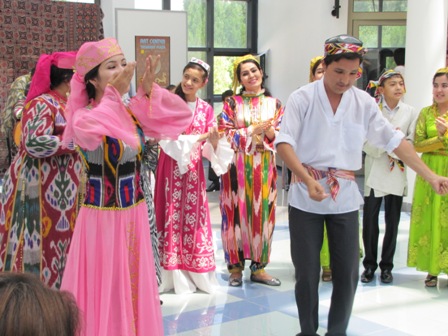Mavrigi
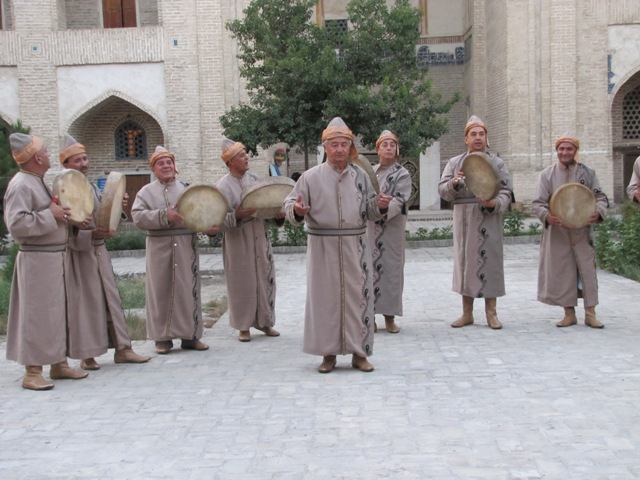
Domain: Performing Arts
Index Number: 02.04.01
Folklore art, which embodies the traditions of oral singing creativity, has a rich history. This is acknowledged by diverse archaeological findings, works of oriental miniature, etc., which came down to us from the ancient past. Notably, in music culture of Uzbekistan the term "sozanda" (literally – "a musician-instrumentalist") is popular term. However, in Bukhara and nearby areas, since ancient times, this term meant a woman, who was a performer of folk songs and dances or a group of women-singers, which, with its song and dances, participated at wedding ceremonies (mostly in women's circles) and pleased viewers and guests. Interestingly, the art of Bukhara sozandas is considered as one of the major ones in music culture of Uzbekistan. And in their creative activity performance of mavrigi occupied significant place.
Mavrigi is a song cycle typical for musical traditions of Bukhara, and has its own distinctive features and performance style. The traditions of performance associated with mavrigi are generally referred to as "mavrigikhonlik" (i.e. "mavrigi performance"). Mavrigi songs are performed by women-sozandas or men-khonandas in accompaniment of doira. It initially emerged and got widespread on the territory of Bukhara Emirate in the Middle Ages (in the ХVI-ХVII centuries) as a distinct type of music creativity of Iranian people. Later on, it became popular among Uzbek and Tajik peoples.
The term "mavrigi" is derived from word "mavri", which is used in relation to Iranian peoples, who came to Bukhara from various parts of Khorasan (mainly from Merv, which represents the area close to present-day Mary, Turkmenistan) at different times and settled. Music-related creativity of Iranian peoples became quickly widespread among population of Bukhara. Consequently, it got improved and changed under influence of local traditions. As a result of these, mavrigi, a new musical style in singing practice, emerged.
Mavrigi is a cycle of folk songs, which intensively evolved in Bukhara during ХIХ and beginning of the ХХ centuries. These types of songs were mainly accompanied by playing on doira. In addition, these types of songs have a couplet form, are very laconic and emotional. Their typical features are: singing in a small range, existence of recitative-melodious or songful type of melos. Poetic texts (for the most part, these are examples of folk poetry), which are used in these songs, are mainly in the form of distiches or quatrains. Sometimes, poems in the form of pentastich ("muhammas") are declaimed in mavrigi. Another feature is presence of an improvisatory musical and poetic text. As a rule, in mavrigi there is a first (or lead) singer who begins singing a song, while the others sing along the verses or words-refrains. Mavrigi opens with a part called "Shahd", which is a small song of songful-lyrical, improvisatory-recitative nature, and which is based on the poems of Khofiz, a classicist of oriental poetry. Then, as the singers move from one song to another, the tempo gets accelerated with songs becoming more cheerful and energetic. Traditionally, the songs have different contents; but mostly relate to love-related and lyrical themes. They are sung in Uzbek and Tajik languages.
Mavrigi songs represent an artistic piece in which it is possible to observe a change of emotional and spiritual state. Also, performance of a song is accompanied by dances. By the end only rhythm-usuls on doira are performed – "Zangbozi" (literally, "playing Zang", i.e. "dance"; "zang" is a little bell or handbell. It represents a percussion instrument in the form of a bracelet with jingle-bells).
Main parts in mavrigi songs are called Shahd ("Intro"), Taraqqiyot ("Progress") and Pirovard ("dénouement", "culmination"), which are organically connected with each other as a chain. Introductory part, "Shahd", begins with singing of lengthy lyrical songs of improvisatory nature. This is followed by songs of different characters (such as Yakkazarb, Daromadi Chorzarb, Corzarb, Gardon, etc.), which have their own tempo and rhythm and which remind of a small poem. In it, the songs of lyrical and dramatic character, acquire peculiar harmonious fusion, which gradually leads, to the beginning of emotional raise. In taraqqiyot a change of various spiritual states is observed, while songs are performed impetuously and impulsively (Maydakhoni, Mayda ghazal, Yor-yor, Bacha-bacha, Ovardan, Muhammas, etc.). The structure of songs is laconic, and is diverse in terms of internal as well as external tempo and rhythm. The melos of these songs evokes somewhat an elevated emotional state. Pirovard represents a culmination part, in which songs are rhythmically more energetic and lively, and usuls of doira are more complex (Khush omadan, Avj, Muhammas, Ufar, Zangbozi, etc.).
According to popular philosophy, mavrigi embodies a triumph of spirituality, when an individual perception of the world achieves harmony with the universe. And this is exactly what is to be found in a scenic composition of ensemble of "Mavrigi", created under Bukhara Regional Philharmonic Society (leader – Orif Atoev).
In the majority of cases mavrigi songs are performed during weddings. And at present, these types of songs became part of the repertoires of singers (sozanda and khonanda from Bukhara) such as Tuhfakhon Pinkhasova, Olima Khasanova, Khaydar Shodiev, Orif Atoev, Murod bobo Khasanov, Mavluda Murodova, Rano Musaeva, Boghdagul Toraeva, Gulchekhra Mamedova; of family ensembles such as Qodirovs family ensemble (as represented by Mashrab, Mashkhura and Murod Qodirovs, who continue the traditions of their mother, Matlab Rajabova, famous sozanda of Bukhara), etc. It bears mentioning that the traditions of mavrigi were revived and became part of the repertoires of such folklore ensembles as "Nozanin" and "Mokhi sitora" (Bukhara). In addition, instrumental melodies of "Mavrigi" for surnay became widespread in Surkhandarya region.





